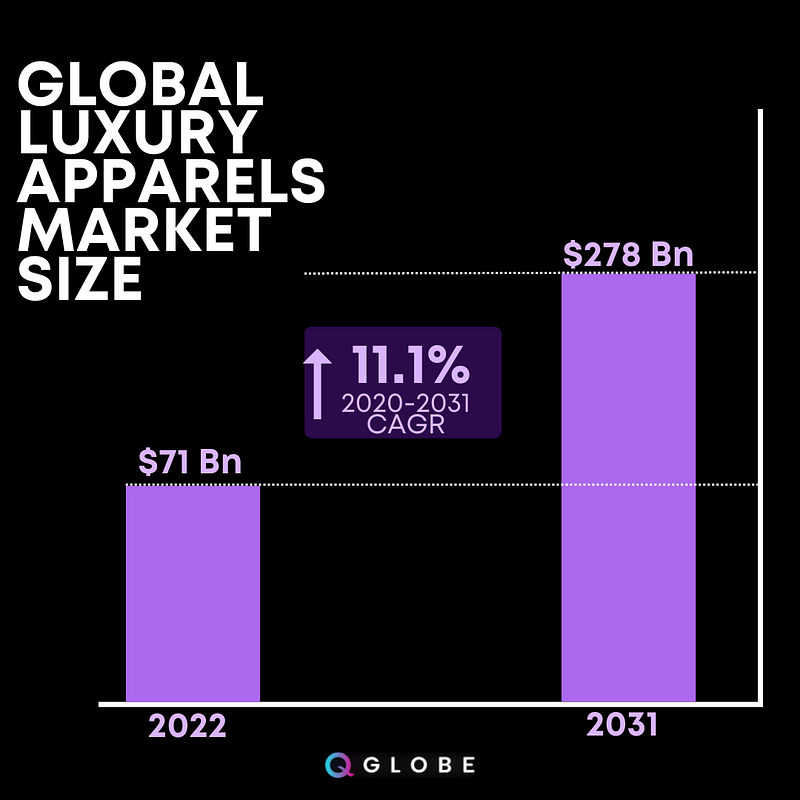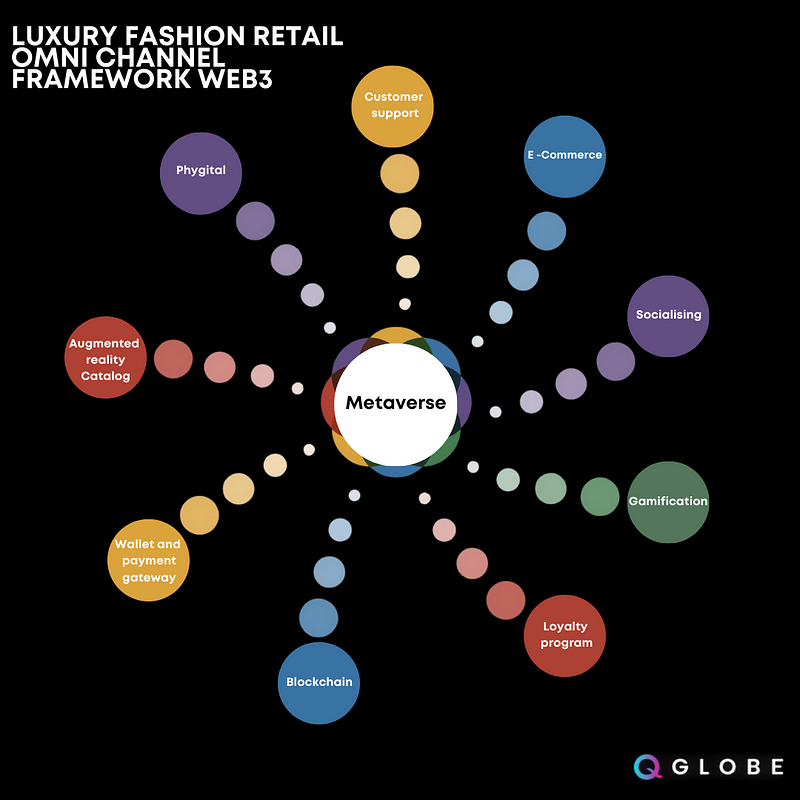
The global luxury apparel market has experienced significant growth in recent years, reaching a value of $71,040.0 million in 2020. This trend is projected to continue, with the market estimated to reach $278,181.5 million by 2031, representing a compound annual growth rate (CAGR) of 11.1% from 2022 to 2031. As we stand at the brink of a revolution within the luxury apparel industry, various concepts and technologies such as blockchain, augmented reality, virtual fashion worlds, gamification, and decentralized payments are creating immersive and engaging omnichannel experiences that go beyond traditional retail channels.

Omnichannel retailing is the practice of integrating various retail channels, such as brick-and-mortar stores, e-commerce websites, social media platforms, and mobile apps, to provide a seamless and consistent shopping experience across all touch points. Blockchain and gamification combined together creates new ways to engage a brands community which allows the possiblity for a new omnichannel framework.
Blockchain technology offers a secure and transparent platform for tracking and verifying the authenticity, ownership, and transaction history of luxury goods. By leveraging blockchain, luxury brands can create a digital trail that enables customers to track the authenticity and ownership of their luxury goods, from the manufacturer to the end consumer. Additionally, with the use of NFTs and loyalty programs we can create gamified concepts which increase user retention and engagement in a secure and transparent environment.
Gamification involves adding game-like elements to non-game contexts to increase engagement and customer loyalty. When combined with blockchain, we can creates an array of games to engage a brands community, ultimately generating more interest in the brand. Furthermore, blockchain enables an in-app economy for brands, which opens up new frontiers such as seamless transparent transactions, powered through a Web 2.5 payment gateway.
Qglobe’s Web3 Luxury Fashion Retail Omnichannel Framework consists of 9 key elements. All of these elements can be combined to create a singular platform which enables customers to conduct all traditional practices in their purchase journey for luxury brands, and more.

The omnichannel framework is powered through a virtual world (metaverse) which allows the enabalment of each element listed, in a singular platform. In this virtual world customers can interact with each other, enjoy an immersive catalog viewing process, interact with blockchain powered e-commerce functionality, engage with customer support, or engage with gamified activities through which users can earn blockchain reward points, and redeem those points for benefits within the virtual world and the physical.
Phygital, the concept of blending physical and digital experiences, has become increasingly important in the luxury fashion retail industry. Customers can use augmented reality to try on clothes virtually, view product information and reviews through their smartphones, and make purchases within the virtual world. By embracing phygital experiences, luxury brands can create a personalized and convenient shopping experience for their customers, while also leveraging technology to enhance their brand value and customer loyalty.
Blockchain technology has the potential to revolutionize loyalty programs for luxury fashion brands. By leveraging blockchain’s secure and transparent platform, luxury brands can create a loyalty program that enables customers to track their rewards and redeem them seamlessly. Blockchain loyalty programs can also help luxury brands to combat fraud and protect customer data by creating a tamper-proof record of all transactions. Moreover, blockchain loyalty programs can provide greater flexibility and interoperability, enabling customers to earn and redeem rewards across different brands and platforms. By creating a more transparent, secure, and flexible loyalty program, luxury fashion brands can enhance customer engagement and retention, ultimately driving revenue growth and brand loyalty.
Blockchain enables us to create an in app economy for brands. Which opens up new frontiers such as seamless transparent transaction which is powered through a Web 2.5 payment gateway. Although it is important to note that Blockchain comes with its challenges, one of the biggest ones is that the user journey in web3 is so complicated that user acquisition costs are too high. Luxury fashion retail brands using this framework should ensure that their entire purchase process is identical to the current user journey that their target market is used to already.
The most important element of this framework is the combination of gammification and blockchain. Many brands have launched gamified blockchain concepts with success. Such as:
Gucci’s Aria collection: Gucci’s Aria collection featured a digital version of its runway show, which included a gamified treasure hunt in the virtual environment. Users were tasked with finding hidden objects throughout the virtual world and were rewarded with exclusive access to the collection and other Gucci merchandise.
TFKT Studios: RTFKT Studios is a luxury NFT brand that creates custom sneakers and other fashion items as NFTs. The brand features a gamified app that allows users to earn and trade various “keys” that unlock access to exclusive content and experiences, such as early releases and virtual events.
Fabricant x DressX: Fabricant and DressX partnered to create a digital fashion collection featuring gamification elements such as interactive designs, virtual fashion shows, and in-app games that rewarded users with exclusive access to the collection.
Through the success of these brands we can understand that there is a dire need for of a true omni channel experience in the Luxury fashion domain which is powered by blockchain. One of the brands that is tackling this concept at full force is called PlayPopGo. Through combining Fashion, Lifestyle and art in the “Omniverse” the founder and creative director Amber Park is on the verge of launching a new omnichannel fashion retail experience.
